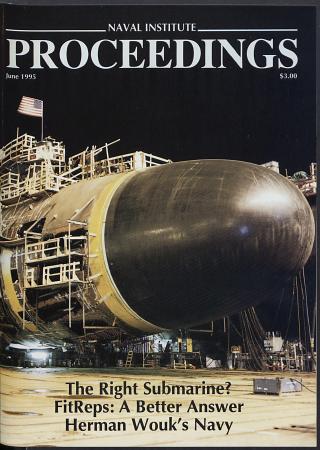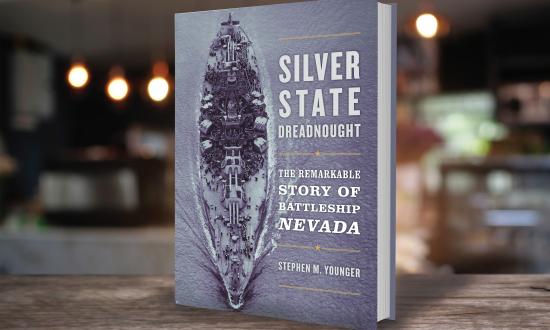From the Editor’s Desk
This theme of this Proceedings is “Fight Smarter,” but perhaps it should be “COVID-19: Month Three,” as the “groundhog day” of remote work and seeing teammates only via video apps continues. As I mentioned in May, I am proud to be part of the Naval Institute and to be able to carry on the 147-year tradition of Proceedings. Without a doubt, some of my predecessors endured greater hardships in getting the magazine published during two world wars, the 1918 influenza pandemic, and the Great Depression, which keeps the challenges in perspective. When we left Beach Hall in mid-March, none of us thought we’d still be working from home two months later with no end in sight. In the plus column, the Naval Institute team is thus far COVID-free. At the same time, it feels like being on a ship whose end-of-deployment date has been extended indefinitely. We’re all in the same boat—yet being separated makes us feel like we’re clinging to separate life rafts. Prepare for heavy seas. This storm is going to continue.
Normally at this time of year, we revel in the joy of working on the Naval Academy Yard. The Hauser terrace on Beach Hall is an ideal place to watch the Blue Angels’ flight demonstration during Commissioning Week. In a normal May, I would have the honor of presenting certificates and checks to the winners of the Capstone Essay Contest (see pp. 60–71) on the Friday before graduation. Many of our staff would participate in checkout day for the graduating class, presenting the Cebrowski Award (a one-year gift membership in the Naval Institute) to each graduating midshipman. We would have a chance to see our former summer interns one more time, and watch the plebes climb Herndon Monument and celebrate the end of a hard first year.
This pandemic is stripping the military of rites of passage. This month’s Need to Know column (p. 10–11) notes that in April the USS Delaware (SSN-791) became the first U.S. submarine to commission itself under way, underwater, away from family and friends, and without ceremony because of the pandemic. As I worked with now-Ensign Joseph Bunyard on his Capstone essay I learned that he returned to the Academy with one fifth of the Class of 2020 for two days, unceremoniously cleaned out his room, was commissioned without family in attendance, and left so the next fifth of the class could “rinse and repeat” the following two days. I missed not getting to meet Ensign Bunyard and his fellow Capstone winners in person.
This issue is full of great, thought-provoking, content. I salute the authors who care enough about the profession to think, research, write, rewrite, and submit their work for publication. I salute the Class of 2020 at the Naval Academy, the Coast Guard Academy, and NROTC and Officer Candidate School graduates. My heart goes out to the newest enlisted Sailors, Marines, and Coast Guardsmen who have finished boot camp and graduated honorably—without family present to congratulate them. COVID-19 is taking the lives of too many people around the world, and that is a great tragedy. While not nearly as tragic, the pandemic is denying our military family the joy that would be had during these key educational, professional, and ceremonial moments.
We must not let the pandemic rob us of the joys that come from these milestones—and from service to a cause greater than self. If you are a shipmate or fellow Marine to one of those youngsters, give them an extra warm welcome to your command and help them find pride, excitement, and satisfaction in the naval profession. And know that we will continue to keep your open forum ready for those who dare to read, think, speak, and write. Until next month, take care of your shipmates and be well!
Bill Hamblet
Captain, U.S. Navy (Retired)
Life Member since 1993
Where We Were
June 1920 Proceedings—In “American Submarine Operations in the War,” Professor Carroll Storrs Alden included operations of the E-2, an earlier-type, 134-foot craft that had been out of commission for years. “It was the E-2 that got so hot on the trail of the German U-117, sinking ships off Cape Hatteras, that the large enemy craft, 275-feet long, immediately changed her theater of operations to the northeast. Her commanding officer remarked after the Armistice, “There was one little Yankee sub that pretty near got me. He got so near that it wasn’t any fun.”
June 1970 Proceedings—Naval aviator Gail Borden reported in “L.S.O.” on the change from Landing Signal Officer to Landing Safety Officer in 1955 with the installation of the first visual landing aid on board a U.S. carrier, and the continuing importance of the L.S.O. “Getting a pilot aboard with a bad case of vertigo, in a battle-damaged aircraft, on a black night with 10 feet of deck-pitch, that makes it all worthwhile. As one pilot put it, “There is no group of individuals on board the carrier that are more respected than the LSOs.”
June 1995 Proceedings—In a Naval Institute dinner address, “Herman Wouk’s Navy,” renowned author Herman Wouk looked back to the early reception given The Caine Mutiny. “Grave reservations were vocally expressed at this model of imperfection (Captain Queeg), who was presented realistically as a Regular naval officer. The turn came when Admiral Fechteler, who was then CNO, was speaking at a banquet. One courageous soul asked, “Have you read this new novel about the Navy. The Admiral said “Yes I have. In a long naval service, I’ve met every one of those sons of bitches but never all on one ship.”
A. Denis Clift
Golden Life Member






